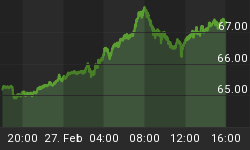Recently I read Ayn Rand's famous novel Atlas Shrugged, which got me thinking about the source of value in currency, among other things. The other day I came across an interesting article from Steve Saville (Economists don't understand money), which got me thinking further about this issue. Theirs were the words that led my thinking for this week's article.
Money, in modern society, is globally accepted as a medium of exchange. This fact that it is so commonly accepted in commerce breeds within its users a desire to possess ever-increasing quantities. However, few people remember that this medium of exchange, in and of itself, has absolutely no intrinsic value. Its value in exchange is based around the fact that people want it and is determined by its users.
Currency the world over has absolutely no practical value in society. It doesn't satisfy a single basic human need, meaning that one can't eat it, drink it, sleep on it, or use it for shelter. Even in our complex economy, it has no real functional use in manufacturing or production.
The single, solitary use for money is as a store of wealth, which can be used whenever the owner wishes to exchange it for something he considers more valuable, namely a good or service.
How funny it is then that this precise argument, so commonly employed by fear mongers, inflation hawks, and political pundits like Glenn Beck, can also be applied to the object of their affection: Gold.
For decades conspiracy theorists and dooms-day subscribers have been peddling gold as an economic panacea. They continually point to poor monetary policy and economic depravity as reasons to store accumulated wealth in "more tangible assets."
Odd indeed that their choice of assets for storing wealth is among the world's oldest currencies, and also one of the first to ever suffer from their most disparaged ailment: debasement.
For evidence of fraud in precious metals, look no further than the recent story of rust appearing on .999 gold coins issued by the Central Russian Bank, according to reports from the International Reserve Payment System (presented on ZeroHedge.com). [For those readers who aren't metallurgists, gold does not rust. Hence, rust appearing on gold coins issued by a central bank indicates obvious fraud, as the coins clearly are not minted of gold.]
For those still unconvinced of the perils of owning or trading in gold bullion - the oldest useless currency in the world - consider the recent ABC News article Gold Coin Sellers Angered by New Tax Law (Rich Blake). According to the article, the trading of gold coins will soon be coming under increased government scrutiny thanks to a little-known provision in Obama's new healthcare bill.
Thanks to Obamacare, at the start of 2012 Americans will be required to submit to the IRS 1099's for all purchases in excess of $600, including both goods and services. This means that there will be (or should be) a Form 1099 produced and submitted to the federal government every time a single ounce of gold trades hands after January 1, 2012 (assuming gold stays over $600/oz).
Gold is undoubtedly a good investment solution for some investors and special situations. However, given the metal's limited functionality or practicality in modern society, its current price seems to be likely inflated. A good deal of investors would be wise to ignore the hype surrounding gold, and spend some time researching the dynamics of such its specialized market to better understand the risks involved.















